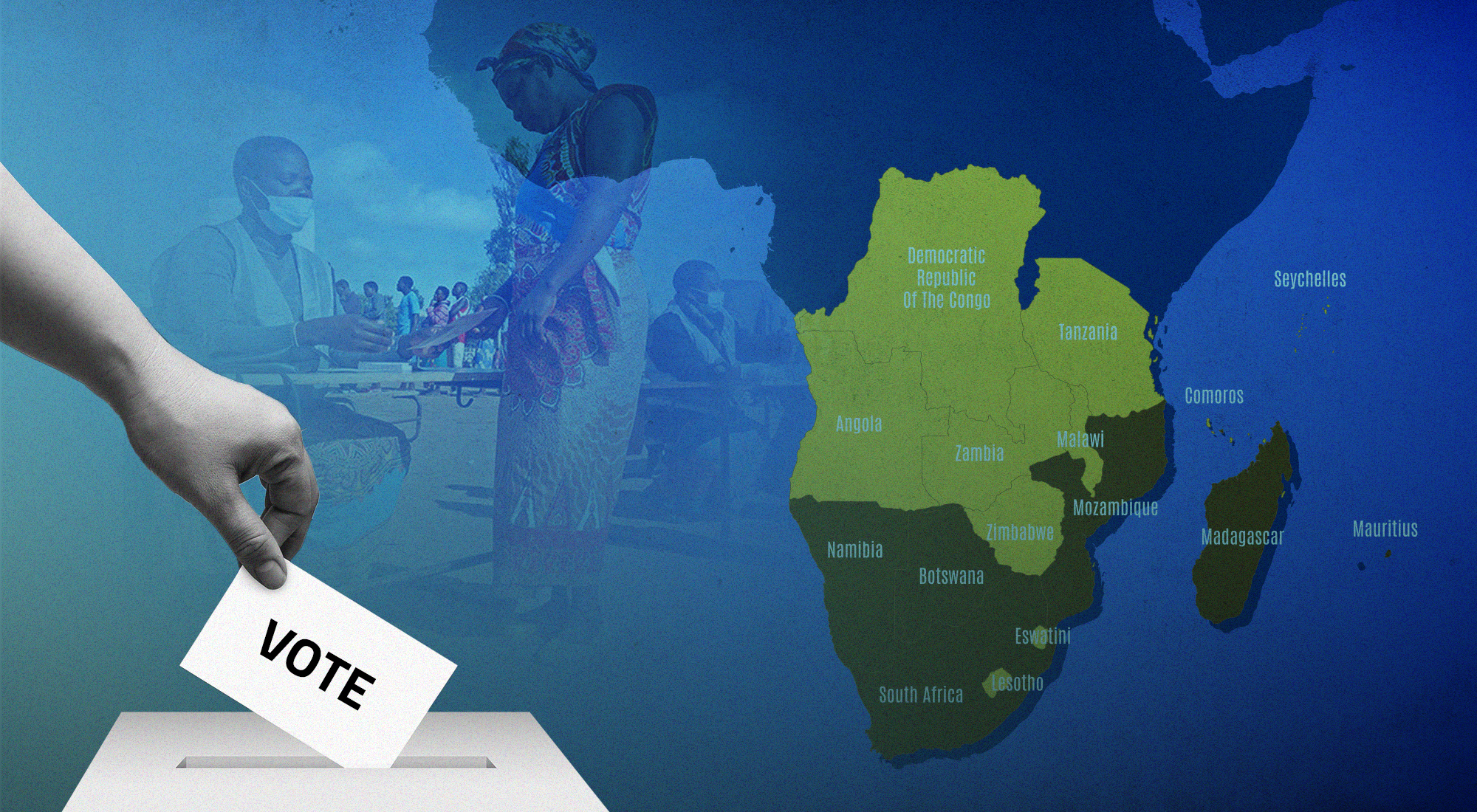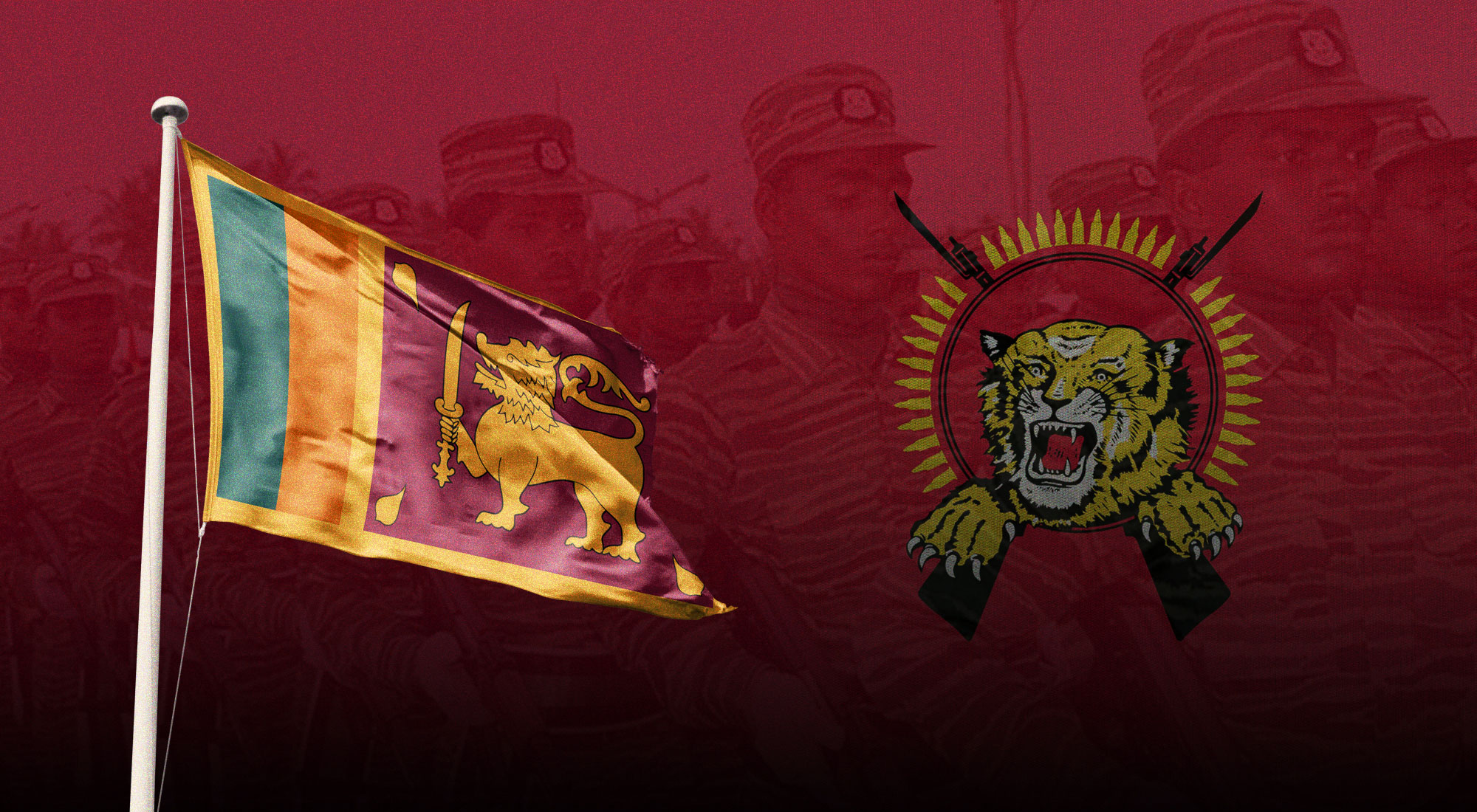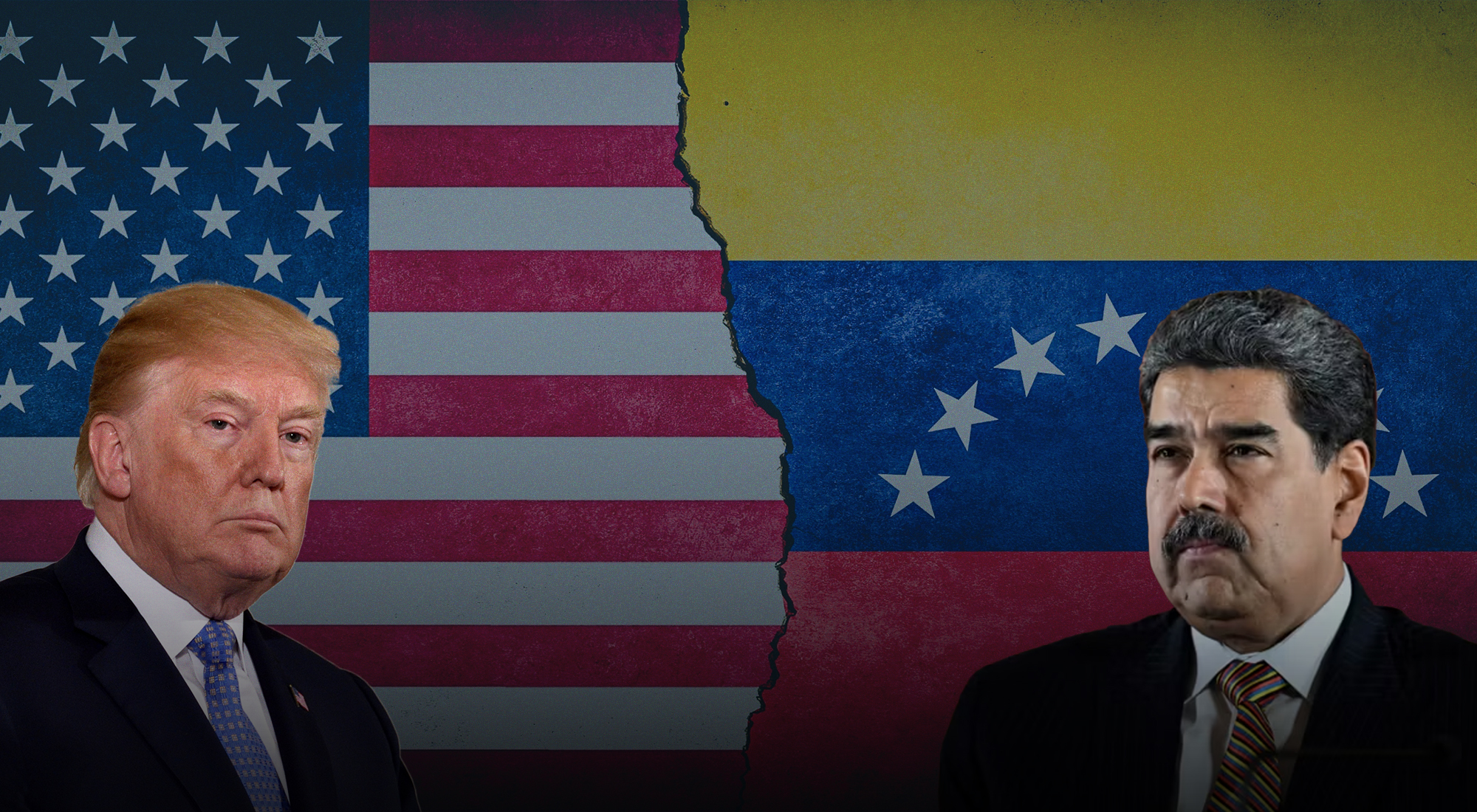Southern Africa’s young democracies have had a busy election year. While all eyes have focused on elections, snap polls and crumbling coalitions across the G7, Southern Africa’s democracies have been undergoing their own upheavals.
Of the 16 members of the Southern African Development Community, seven countries held national or presidential elections in 2024, including South Africa, the region’s largest economy.[1] Based on official tallies, incumbents prevailed in four out of the seven elections.
However, among the three incumbent losses, two occurred in countries where the ruling parties had enjoyed decades-long winning streaks. Coupled with the declining popularity of incumbents even when they won, either with narrower margins or through unprecedented post-election suppression of popular protests, the results suggest that Southern Africa’s population is increasingly agitating for change.
While Covid-19 and the post-pandemic economic shocks have certainly increased economic pressures on voters, the distribution of incumbent losses does not align predominantly with the countries that faced the worst economic shocks. This raises the question of what factors may have predicted these losses and what they mean for countries with re-elected incumbents facing declining political capital.
Bifurcation in election results along the level of political freedom suggests that countries that have enabled popular expression to have a safety valve, which has enabled relatively peaceful political transition. In contrast, countries reporting lower political freedoms are trending to become less free and repressive. The safety valve is not working. This is likely to drive growing economic instability in those countries as political elites struggle to suppress growing popular discontent.
An end state for those countries, may be Mozambique, which, rather than experiencing an economic boom from hydro-carbon exports and foreign investment in its supply-chain infrastructure, is currently gripped with the most significant violence since the end of its civil war, from both terrorists and urban civil society. Zimbabwe’s lost decades of development suggest that continued suppression of civil society by incumbents can lead to long-term economic slumps, that are difficult to exit from.
While safety valves have not guaranteed development (Malawi remains poor, even after decades of replacing incumbents), they have not resulted in the extensive economic damage and levels of violence that Mozambique is experiencing now, and Zimbabwe has been mired in for over 2 decades.
SADC Election Results in 2024: Impacts on Stability
Table 1: Electoral outcomes
| Type of election | Election month | Registered voters | Outcome | Voting trend (turnout*)[2] | Violent events increased during elections | Reported political violence trends post elections | |
| Comoros | Presidential | January | 339 000 | Incumbent retained seat | Incumbent share of votes fell by 3% to 57% (56%) | Yes | No change (Average 1 per week) |
| South Africa | National and provincial legislatures (and president) | May | 27.8m | Incumbents lost majority | Incumbent share of votes fell by 17% to 40% (59%) | Yes | Decline in violence (Average 40 per week from 50-60 events before elections) |
| Madagascar | National legislature | May | 11.6m | Incumbents’ coalition retained majority | Incumbent share of votes fell by 5% to 51.5% (54%) | Yes | Marginal increase (Average has risen from ~13 to 14 events in Sept. before falling) |
| Mozambique | President, national legislature | October | 16.6m | Incumbent retained majority, but results are contested | Incumbent share of votes rose by 3% to 78% (N/A) | Yes | Risen (Average rien from ~10 to >35 events per week) |
| Botswana | National legislature | October | 1m | Incumbents lost majority | Incumbent share of seats fell by 60% to 6% (81%) | Yes | Risen (Average up to over 1 per week off zero base) |
| Mauritius | National legislature | November | 1m | Incumbents lost majority | Incumbent share of seats fell by 60% to 0% (78%) | Yes | Too soon to tell |
| Namibia | Presidency, national legislature | November | 1.36m | Incumbents retained seats | Incumbent share of votes fell by 12% to 53% (76%) | Too soon to tell | Too soon to tell |
Source: Comoros, Madagascar, South Africa, Mozambique, Botswana, Mauritius, Namibia, Acled IFES
*Votes cast as a percentage of eligible voter
South Africa’s already high rates of violence rose in the first quarter of the year, leading up to the elections in May, but subsequently declined to typical levels after the elections. This period also coincided with the end of power blackouts, which had hampered policing operations. The election results marked a significant shift for South Africa, with the African National Congress (ANC) and its coalition partners losing their majority for the first time since democratic elections began in 1994. The resulting coalition of the ANC and opposition parties has generally been well received by both the electorate and foreign investors.
May also saw elections in Madagascar for seats in the national legislature, following a late 2023 presidential election that suffered from low turnout and opposition party boycotts. It is unsurprising that violence levels did not increase during the legislative elections, as tensions had already been running high since the presidential elections. The legislative election results led to the incumbent coalition retaining its majority, but only after court interventions and accusations of vote rigging.
This year’s elections have failed to address growing discontent with the electoral system.[3] Violence has continued to trend upwards since the elections. Low voter turnout (around 48%[4]),%), the high proportion of independent candidates elected (31% of seats), and a decline in the share of the popular vote for the incumbent coalition (which received only 42% of the vote but still managed a majority of elected officials) suggest that Malagasy political elites continue to face popular illegitimacy.
The second half of the year hosted the majority of 2024’s elections, with arguably more momentous outcomes for the countries involved.
Mozambique’s October elections reflected growing disenchantment with incumbents. Following increasing violence during previous elections[5], the announcement that the ruling Frente de Libertação de Moçambique (FRELIMO) party had won 70% of the popular vote triggered mass protests that have continued into December. Election observers reported widespread issues, including ballot inflation, misinformation campaigns, and intimidation of the opposition.[6]
The rising protests have significantly impacted Mozambique’s economy, which has struggled to recover from a financial scandal and a terror insurgency in the north that has hindered the exploitation of nearby natural gas fields. Maputo’s port—a source of substantial foreign investment and a key alternative to South Africa’s underperforming ports for commodity exporters—was closed, along with a major border crossing with South Africa. Ratings agencies have put Mozambique on watch, with S&P downgrading Mozambique’s rating to CCC, just one level above default.
In contrast, Botswana’s election marked the dramatic end of the Botswana Democratic Party’s (BDP) 58-year rule in largely peaceful elections. While most analysts had predicted the loss, the scale of the defeat was unexpected. The BDP lost 34 seats—almost 50% of those available—to the Umbrella for Democratic Change (UDC) and other opposition parties. The transition was notable for the incumbent’s concession speech, delivered even before the final results were announced.[7] Botswana’s historically low levels of violence (with most weeks reporting no incidents) have since ticked up slightly, averaging one reported event per week in November. The election itself saw just two reported violent events.
Two elections in November have yet to generate post-election trends on instability. In Mauritius, the election resulted in the ousting of the incumbent by a significant margin, with the opposition winning 60 out of 62 seats[8]. Mauritius’ traditionally high voter turnout is unlikely to have changed.[9] The country was also experiencing strong economic growth, posting impressive figures. However, the elections were marred by damaging leaks of conversations involving public officials, followed by digital media blackouts imposed by the incumbent Prime Minister. The elections were also preceded by a rising rate of reported violence, which, although still low, had nearly doubled from the start of the year to four incidents per week.
Namibia’s election at the end of November was widely anticipated to result in another loss for incumbents. The ruling South West African People’s Organisation (SWAPO), which has been in power since Namibia’s transition to democracy in 1989, was expected to lose its majority, reflecting a long-term trend of voter disenchantment. The preliminary results (as of the first week of December) suggest that SWAPO may have continued its downward trajectory, securing 53% of the parliamentary vote (and seats), down from over 65% in 2019.[10]
However, accusations of voter suppression and unlawful, inconsistent extensions of voting hours in some areas have led civil society groups and opposition parties to file legal complaints with the electoral and constitutional courts.[11] Despite these tensions, Namibia’s traditionally peaceful society maintained its trend of low levels of reported violence in the lead-up to the elections.
“It’s the Economy, Stupid!”[12]
James Carville’s famous quote about the 1992 elections in the United States (U.S.) has continued to resonate with election observers and has been identified as winning election campaigns, including this year’s U.S. elections.[13] Since the prior election cycle, COVID-19 and its subsequent impact on economies have created an unusually volatile economic period for the region. In 2020, all economies experienced negative real growth. This was followed by above-trend recoveries in 2021 and 2022 for some countries, including Mauritius (see Figure 1 below).
Of the three countries that lost incumbents, Mauritius had recovered strongly from COVID-19 and posted above-group GDP growth after 2022. Botswana also recorded relatively strong GDP growth figures since its last elections, with the third highest GDP growth (still negative) in 2020, followed by two years of above-group growth. However, 2023 and 2024 saw marked slowdowns, leaving it near the bottom of the group, along with South Africa, the region’s economic underperformer.
On the inflation front, average inflation since 2020 has been 1.5% higher than in the years preceding the pandemic, suggesting macroeconomic headwinds for households, whose income growth typically lags inflation, making them feel poorer during periods of elevated inflation.
When reviewing individual country inflation rates, countries where incumbents lost power did not have higher average inflation rates during the five years leading up to 2024 compared to those where incumbents retained power. It is also surprising that Mozambique, with middling inflation rates over the five years to 2024 (similar to Botswana and Mauritius) and the highest growth in nominal GDP per capita and overall GDP during this period, has faced the highest incidences of post-election violence in the 2024 election cycle. This suggests that factors other than economic conditions have driven incumbent losses in 2024.
Political Freedom and Electoral Defeats
When overlaying levels of democratic freedom with the elections, one can discern a trend where less free countries have been less likely to replace incumbents (see Table 1 below). Democracies around the world have been particularly harsh on incumbents in recent years for various reasons.[14] In Southern African countries, higher political freedom ratings have correlated with a higher rate of incumbent losses in elections.
Table 2: Political and Economic Freedom (as measured by Freedom House) and elections results in 2024
| 2024 election result for incumbent | Freedom House | Combined Score | Trend score since 2013 | Political Freedom | Economic Freedom | |
| Comoros | Won (declining support) | Partly Free | 42 | Down | 16 | 26 |
| Mozambique | Won (similar share) | Partly Free | 44 | Down | 14 | 30 |
| Madagascar | Won (declining support) | Partly Free | 58 | Up | 24 | 34 |
| Botswana | Lost | Free | 72 | Neutral down (<3 point change) | 28 | 44 |
| Namibia | Won (declining support) | Free | 77 | Neutral up (<3 point change) | 31 | 46 |
| South Africa | Lost | Free | 79 | Neutral down (<3 point change) | 33 | 46 |
| Mauritius | Lost | Free | 85 | Down | 35 | 50 |
Source: Freedom House, Trends analysis
Concluding Remarks
When given the opportunity, Southern Africa’s small, open, commodity-reliant economies were more likely to vote to replace incumbent political parties, much as more developed and industrialized economies have done so when they had the opportunity in 2024.
This correlation raises the question of whether local economic and social pressures, of which there are many, are the drivers, or whether global mega-trends are increasingly shaping local political discourses.
The economic shocks from COVID-19 (a global experience), combined with a rising share of young, digitally connected voters with limited loyalty to liberation movements (both global and local trends), suggest that Southern Africa’s older generation of political leaders may be out of touch with economic priorities on the ground.
In all Southern African countries that voted in 2024 (except Mozambique, where results have been questioned), voters have withdrawn support for incumbents, even for those who retained power. Where political and economic freedoms are high, the likelihood of replacing the incumbent increased. This suggests that leaders in less free countries have contributed to growing frustrations within their societies, which would have voted to replace them if given the chance.
The implications for SADC countries are significant. Political suppression is likely to result in growing social tensions. The outcome may resemble Mozambique’s current situation or Zimbabwe’s experience over the past two decades. Growing civilian protests, met with rising state repression, have spilled over into the broader economy. In Mozambique’s neglected northern provinces, radicalization by terrorist groups has drawn in regional peacekeepers to quell the unrest. The result is that a country that should now suffer from an economic Dutch Disease due to its significant gas reserves and agricultural potential, is struggling to meet its debt obligations. Consequently, youth migration into the rest of the region has increased, feeding South Africa’s large illegal “Zama Zama” gold mining networks.[15]
For countries that have allowed political expression at the ballot box and in economic life, the outcome is less certain. Replacing incumbents does not guarantee strong economic development, but provides an opportunity to implement reforms and growth enhancing policies. Whether this opportunity is taken will depend on the motivation and vision of new leaders to enact, sometimes difficult, economic reforms. These reforms are very likely to create their own economic challenges, potentially leading voters to reconsider their choices in five years.
In 2025, the number of national elections in the region declines to two.[16] Malawi is scheduled to hold presidential elections, while Tanzania will hold presidential elections alongside elections for both the national and Zanzibar assemblies.
In Malawi, the liberation party, the Malawi Congress Party recovered the presidency in 2020 for the first time since 1994.[17] It seems to have come full circle but continues to struggle with development. Malawi has marginally improved its Freedom House score since 2013 to 66 points, providing a pressure release valve for voter discontent. Whether it can maintain those freedoms in the face of ongoing development challenges remains to be seen.
Tanzania’s Chama Cha Mapinduzi (CCM), Africa’s second longest ruling party, has seen its Freedom House scores drop from 66 in 2013 to 36 points in 2024. Recent local government election results suggest the CCM holds a significant advantage over opposition parties going into next year’s elections.
The results of 2024 in Southern Africa suggest that Malawi’s elections may lean toward a loss for the incumbent. In Tanzania, low Freedom House scores suggest the elections are likely to increase the disconnect between the CMM and young voters, who make up the majority of the electorate. This raises the likelihood of election violence spilling over into the broader economy and heightening frustrations.
[1] International IDEA. “The 2024 Global Elections Supercycle.” Accessed December 10, 2024. https://www.idea.int/initiatives/the-2024-global-elections-supercycle.
[2] International Foundation for Electoral Systems (IFES). Accessed December 10, 2024. https://www.ifes.org/, Electoral Commission of Namibia. “National Assembly Elections.” Accessed December 10, 2024. https://www.elections.na/NationalAssembly.aspx, and Inter-Parliamentary Union. “Election Results – Madagascar.” Accessed December 10, 2024. https://data.ipu.org/parliament/MG/MG-LC01/election/MG-LC01-E20240529/.
[3] Inter-Parliamentary Union. “Election Results – Madagascar.” Accessed December 10, 2024. https://data.ipu.org/parliament/MG/MG-LC01/election/MG-LC01-E20240529/.
[4] Africanews. “Madagascar Ruling Party Loses Parliament Majority.” June 12, 2024. https://www.africanews.com/2024/06/12/madagascar-ruling-party-loses-parliament-majority/.
[5] Africa Center for Strategic Studies. “2024 Elections: Mozambique.” Accessed December 10, 2024. https://africacenter.org/spotlight/2024-elections/mozambique/.
[6] Inter-Parliamentary Union. “Election Results – Mozambique.” Accessed December 10, 2024. https://data.ipu.org/parliament/MZ/MZ-LC01/election/MZ-LC01-E20241009/.
[7] The Guardian. “Botswana President Mokgweetsi Masisi Concedes Defeat after Six-Decade Rule.” November 1, 2024. https://www.theguardian.com/world/2024/nov/01/botswana-president-mokgweetsi-masisi-concedes-defeat-election-six-decade-rule.
[8] AP News. “Mauritius Election Results: Opposition Victory in Landslide.” Accessed December 10, 2024. https://apnews.com/article/mauritius-election-results-opposition-victory-landslide-af70d3a8810f7992cef4d1d75bbef769.
[9] International Foundation for Electoral Systems. “Election Guide.” Accessed December 10, 2024. https://www.electionguide.org/elections/id/4363/.
[10] Moneyweb. “Namibia’s Ruling Party Retains Power in Worst Election Showing.” Accessed December 10, 2024. https://www.moneyweb.co.za/news/south-africa/namibia-ruling-party-retains-power-in-worst-election-showing/.
[11] Informanté. “Namibia Elections.” Accessed December 10, 2024. https://informante.web.na/?p=366950, and The Namibian. “Namibia’s Elections Described as a Sham.” Accessed December 10, 2024. https://www.namibian.com.na/namibias-elections-described-as-a-sham/.
[12] American Enterprise Institute. “It’s the Economy, Stupid.” Accessed December 10, 2024. https://www.aei.org/economics/its-the-economy-stupid/.
[13] Gallup. “Economy Is the Most Important Issue for 2024 Presidential Vote.” Accessed December 10, 2024. https://news.gallup.com/poll/651719/economy-important-issue-2024-presidential-vote.aspx.
[14] AP News. “Global Elections 2024: Incumbents Defeated.” Accessed December 10, 2024. https://apnews.com/article/global-elections-2024-incumbents-defeated-c80fbd4e667de86fe08aac025b333f95.
[15] BusinessLIVE. “Stilfontein’s Zama Zamas Hired as Casual Labourers, Then Forced Underground.” Accessed December 10, 2024. https://www.businesslive.co.za/bd/national/2024-11-29-stilfonteins-zama-zamas-hired-as-casual-labourers–then-forced-underground/.
[16] Electoral Institute for Sustainable Democracy in Africa (EISA). “Election Calendar.” Accessed December 10, 2024. https://www.eisa.org/election-calendar/.
[17] Encyclopaedia Britannica. “Malawi: History.” Accessed December 10, 2024. https://www.britannica.com/place/Malawi/History.









